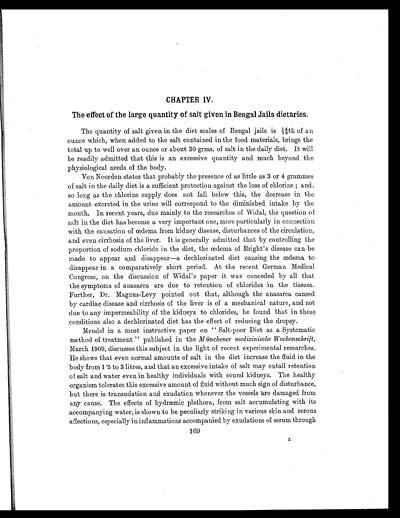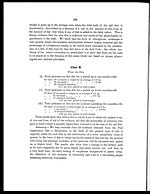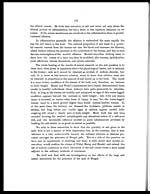Medicine - Institutions > Army health reports and medical documents > Scientific memoirs by officers of the Medical and Sanitary Departments of the Government of India > Number 37 - Investigations on Bengal jail dietaries > Part I > Chapter IV - Effects of the large quantity of salt given in Bengal jail dietaries
(179) Page 169
Download files
Individual page:
Thumbnail gallery: Grid view | List view

CHAPTER IV.
The effect of the large quantity of salt given in Bengal Jails dietaries.
The quantity of salt given in the diet scales of Bengal jails is 14/16th of an
ounce which, when added to the salt contained in the food materials, brings the
total up to well over an ounce or about 30 grms. of salt in the daily diet. It will
be readily admitted that this is an excessive quantity and much beyond the
physiological needs of the body.
Von Noorden states that probably the presence of as little as 3 or 4 grammes
of salt in the daily diet is a sufficient protection against the loss of chlorine; and,
so long as the chlorine supply does not fall below this, the decrease in the
amount excreted in the urine will correspond to the diminished intake by the
mouth. In recent years, due mainly to the researches of Widal, the question of
salt in the diet has become a very important one, more particularly in connection
with the causation of œdema from kidney disease, disturbances of the circulation,
and even cirrhosis of the liver. It is generally admitted that by controlling the
proportion of sodium chloride in the diet, the œdema of Bright's disease can be
made to appear and disappear—a dechlorinated diet causing the œdema to
disappear in a comparatively short period. At the recent German Medical
Congress, on the discussion of Widal's paper it was conceded by all that
the symptoms of anasarca are due to retention of chlorides in the tissues.
Further, Dr. Magnus-Levy pointed out that, although the anasarca caused
by cardiac disease and cirrhosis of the liver is of a mechanical nature, and not
due to any impermeability of the kidneys to chlorides, he found that in these
conditions also a dechlorinated diet has the effect of reducing the dropsy.
Mendel in a most instructive paper on “Salt-poor Diet as a Systematic
method of treatment" published in the Münchener medizinische Wochenschrift,
March 1909, discusses this subject in the light of recent experimental researches.
He shows that even normal amounts of salt in the diet increase the fluid in the
body from 1.5 to 3 litres, and that an excessive intake of salt may entail retention
of salt and water even in healthy individuals with sound kidneys. The healthy
organism tolerates this excessive amount of fluid without much sign of disturbance,
but there is transudation and exudation whenever the vessels are damaged from
any cause. The effects of hydræmic plethora, from salt accumulating with its
accompanying water, is shown to be peculiarly striking in various skin and serous
affections, especially in inflammations accompanied by exudations of serum through
169
Z
Set display mode to: Large image | Zoom image | Transcription
Images and transcriptions on this page, including medium image downloads, may be used under the Creative Commons Attribution 4.0 International Licence unless otherwise stated. ![]()
| Permanent URL | https://digital.nls.uk/75033252 |
|---|




